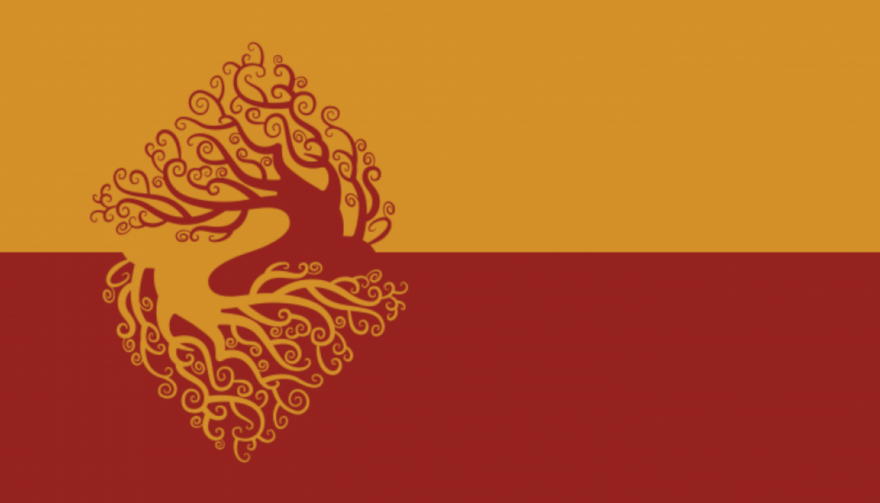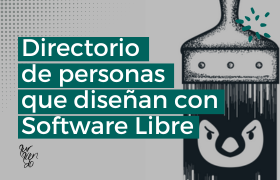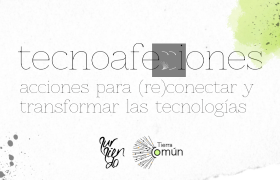Imagining a principle for a feminist internet focusing on environmental justice

“A feminist internet respects life in all its forms; it does not consume it. Our proposal for a feminist internet principle in relation to the environment resignifies care towards an ethics of collective care in choices around design, extraction, production, consumption and disposal of the technologies involved.”
By Jes Ciacci – Sursiendo
Publish in GisWatch
Introduction
In July 2019, 26 women from diverse backgrounds met together in Chiapas, Mexico for three days in a hackfeminist meeting on technology and affections to imagine a principle for a feminist internet that centred care for the body, the self, the land – a principle that speaks to promoting respect for human and collective rights and that weaves policies of co-responsibility and interconnection to all life and land.
The wisdom and magic from this gathering fed into two more moments where a wider group of people shared experiences, dreams, struggles and grief and suggested steps, grounded in feminist action, towards an internet that respects all life. The first was a session during the APC member convening in October 2020 entitled “I do not want to lay down mountains to be able to use the internet: Decolonising technology as an act of care for the Earth and ourselves». In November, at the 2020 Internet Governance Forum (IGF), APC and Sursiendo co-hosted a Day 0 event called “Environmental justice and an anti-extractive internet: Impacting policy through developing a feminist principle”.
This report draws on the deep process from the hackfeminist meeting on technology and affections to imagine a principle for a feminist internet with supporting wisdom from the two other moments.
Background to the Feminist Principles of the Internet
The Feminist Principles of the Internet (FPIs)1 are a series of statements that offer a gender and sexual rights lens on critical internet-related rights. They were drafted at the first Imagine a Feminist Internet meeting that took place in Malaysia in April 2014. The meeting was organised by APC and brought together 50 activists and advocates working in sexual rights, women’s rights, violence against women, and internet rights. A second Imagine a Feminist Internet meeting was held in July 2015, where a new group of 40 activists discussed, elaborated and revised the set of principles.
Currently there are 17 principles in total, organised in five clusters: access, movements, economy, expression and embodiment. Together, they aim to provide a framework for women’s movements to articulate and explore issues related to technology. We look forward to finalising the 18th principle on the environment.
The FPIs are currently available in 11 languages.2
Reflections from Chiapas and beyond
Does the experience of coming close to other processes open up worlds of possibility? This motivation, and many conversations between the conveners,3 inspired us to organise in Chiapas (in southern Mexico) the “Hackfeminist gathering of technologies and affections: How to sketch politics of shared responsibility?”4 in July 2019. Twenty-six of us, women from different backgrounds, put our heads together and thought about digital spaces from our situated experiences working with technology, care, feminism, land and territorial defence, academia and activism.
Relating digital technology to human affections is becoming more common. In this gathering, it was important for us to open space to talk about our perspectives from our different struggles and experience. We centred our spaces of reflection-action on building fair and ethical technologies – for us and the environment. If depoliticising dis-affects relationships, our purpose and intention are to politicise through feelings, emotions and affection. Our purpose is to weave politics of shared responsibility and accountability.
Technologies have granted scope and opportunity for interaction, creation and knowledge like never before in human history. These achievements are substantial and visible, especially when they help, support or promote respect for human and collective rights.
Despite this, it is becoming more and more evident that the underlying ideology of how technology is designed, developed and built contributes to a model that hides dispossession and abuse towards the same rights it claims to protect, both in our immediate contexts and the lives of other people that live farther away. «Technology by no means is neutral. It reflects the ideals of its funders.»5
The material reality and tangibility of technology are connected to a model that extracts natural «resources». I use quotes to highlight the specific global market and industry perspective, and how they think about and relate to nature. Every interaction, every piece of knowledge, is susceptible to monetarisation by the global market value system; an ideology that hides its burden and impact. We see new, shiny fast-connecting devices. Computers, phones, tablets, watches, traffic lights, refrigerators, cars, cash machines with more «efficient and responsive» communication systems; the «cutting-edge tech of the future and progress available to all.»6 They entail freedom, democracy, civilisation, innovation and development. But they don’t tell us how, why, or for whom.
This model reinforces a dynamic of indiscriminate extractivism. It is a manufacturing model dependent on water, minerals, air, energy and the displacement of people, with the accumulation of data as its main commodity.7 Neoliberal capitalism and digital technology, an obedient child, manufacture and consume at the pace of the boundless growth of the market economy. Other ways of economy, other types of relationships are not allowed. The result is monotonous, linear, cumulative thinking.
Concepts and tags are created as a façade. There are many adjectives used for technology that suggest care towards people and the environment, but are empty gestures: environmentally “friendly”, environmentally “aware” or “responsible», “sustainable”, “ecofriendly”. Meanwhile, other ways of thinking, living and relating are seen as an “obstacle” for human development and well-being.
But thinking inside of the capitalist framework only enables capitalist solutions. For us, technology is not a gadget but a relational device. It entails relationships that we commit to; we affect and care for each other in a collective network. Letting ourselves imagine8 outside the box of development is essential for weaving other relationships. These narratives tell us we can’t think outside the mainstream consumerism model. And if it is possible, we are not the ones that can do so. But expertise is not the only way of approaching knowledge. Knowledge is created through curiosity and experimentation.
We can live technology as a relational fabric of affectations and affects, as we did for the days we gathered from different moments and perspectives. We decided to show up and be present, facilitated by activities that enhanced our perception, such as our sense of hearing. We portrayed our preferred identities and started by asking ourselves if the way we embody technology is fair to our bodies, feelings and contexts. How can we reshape technology so that other possible futures of care and shared accountability can emerge? How do we phrase our future technology?
We covered a drawing of the current internet architecture with objects to identify its material form and connections. How can it become more equal and closer to our realities? We set up communication and information storage services on a Raspberry Pi9 and imagined what it would take to maintain them daily. We invited women allies from land defence movements to share their struggles, motives, worldviews, desires and hopes. We navigated the pathways of technology using the example of manufacturing a mobile phone to identify how it affects territories, bodies and labour structures. Through inputs, conversations, reflections and embodied exercises, we came up with possible initiatives, including a feminist internet principle centred on environmental justice.
We reviewed images that represent objects in our current internet infrastructure: satellites, submarine cables, industrial fans, server farms, pipes, modems, antennas, computers, mobile phones and other devices. We need to ask ourselves what we share, with whom we communicate, and why. We need to ask ourselves how long we want information to be available. By design, everything is «stored» – a business model that profiles us as consumers of products, services and ideologies. How can our relationship with technology be more equal and fair? These questions allow us to think and choose other possible connections, and not vice versa. They also help us identify how much time we want to invest in enabling this alternative way of connecting.
A feminist internet has to do with the means of production pointing towards other ways of thinking and taking action. We invite ourselves to re-shape and re-build the internet with the people we want to, dismantling the concept of expert knowledge, politicising care, questioning terminology, contextualising what we really need. And, as our allies in Colima say, «Speak less, speak slowly, listen deeply.»
First, we put our heads together in Chiapas to think about a feminist internet centred on environmental justice; then, some months later, we gathered in Colima and Guadalajara.10 The following words are an intertwined articulation of our collective reflections.
We observe that not all people or realities are considered in networks. We believe that infrastructure autonomy should be transversal and grant new meaning to what we conceive as life free of exploitation. We can share infrastructure, software and networks through community cooperative services based on the principles of slowing down and not having 24/7 access. We also come back to the idea of domestic technology related to collective and family care, highlighting its importance as a way of sustaining life. If we start to think this way, we start to understand that machines also need to take a break.
We mapped out a spiral diagram that distributes our communication through a reduced amount of interconnected nodes, scaling from small to big, to reframe our communication needs and find new routes that can satisfy them without disregarding the impact involved.
This vision implies decentralising so we can connect with each other and strategically deploying the resources we already have, engaging with other territories and their struggles, in federated networks, through different types of communication and verbal expression.
We imagined creating our own intersectional, intercultural feminist code to build an internet with new perspectives on time and space (for nature, for humans, for our personal lives and across generations), and new understandings of instinct, sensory perception, memory and observation. This code would be encrypted, stored locally, and open to ongoing debate within the communities that administer the code. An internet with wireless repeaters does not depend on massive wired infrastructure.
Some of these systems would define the energy resources we want to fuel our internet with. We know there are certain technologies increasingly connected to sustaining nature. We imagined using digital tech as a way of observing plant growth cycles, revealing other means of sustainability. This adaptation implies conceiving ourselves as part of the cycle of nature, re-establishing natural restoration mechanisms, and applying them to our social relationships.
We frame shared accountability as a collective effort to preserve and sustain life, shifting our sense of community. We considered new perspectives on labour such as tequios11 and creating local energy with less impact on the environment, through procedures like composting, recycling waste, and reutilising water (greywater) to cool small data centres. These data centres wouldn’t be working 24/7, but intermittently by choice and principle.
When considering the characteristics of the devices we use, we asked ourselves: what happens to “space waste”? We need mechanisms to gather this, and that are accountable in its use. From our daily lives, we imagine shared, reusable modular devices that shift from a universal to a localised design, adaptable to communities that value human contact as the foundation of collective creation.
A feminist internet respects life in all shapes and colours. It is not a consumer. Our proposal of a feminist internet principle related to natural ecosystems reframes care as a collective ethos that makes decisions about the design, extraction, manufacture, usage and disposal of the technology we relate to.
We admit it is a complex ideal and that comfort can challenge it and even put it at risk. We invited ourselves to start engaging with communities that are already involved in this type of process and support a commitment to basic education that can enable our ideals. This will involve undertaking an ongoing exercise of approaching new, diverse ways of conceiving time and space in communication beyond universality.
Lastly, we pointed out that we don’t want to promote a one-version proposal as the only way or solution, but rather to encourage each group and community, from their own realities, to find the strategies that contribute to building more equal and ethical worlds. We consider it important to discard global economy values and focus on local value. The challenge starts by being able to imagine it.
Footnotes
1. https://feministinternet.org/en
2. https://feministinternet.org/en/download
3. Nadia Cortés, Paola Ricaurte and Jes Ciacci.
4. Sursiendo. (2019, 16 July). Encuentro hackfeminista en Chiapas: estar en analógico para construir entornos digitales más dignos para nosotras.
5. Nibo. (2020, 15 February). Desencriptando el capitalismo.
6. Based on comments made by participants in the Colima and Guadalajara workshops.
7. Nibo. (2020, 15 February). Op. cit.
8. Sursiendo. (2020, 17 November). Escrituras hackfeministas para otras tecnologías. https://sursiendo.org/blog/2020/11/escrituras-hackfeministas-para-otras-tecnologias
9. https://www.raspberrypi.org
10. Sursiendo. (2019, 3 September). ¡Jornadas hackfeministas se mueven por Colima y Guadalajara! https://sursiendo.org/blog/2019/09/jornadas-hackfeministas-se-mueven-por-guadalajara-y-colima/
11. The word tequio comes from the Indigenous language Náhuatl and refers to a form of collective work. Contributing to this collective work is considered an honour for the participants, and is also understood as a moral obligation as well as an opportunity to come together, work towards a common goal, and forge a sense of community identity.
Notes:
This report was originally published as part of a larger compilation: “Global Information Society Watch 2020: Technology, the environment and a sustainable world: Responses from the global South»
Creative Commons Attribution 4.0 International (CC BY 4.0) – Some rights reserved.
ISBN 978-92-95113-40-4
APC Serial: APC-202104-CIPP-R-EN-DIGITAL-330
ISBN 978-92-95113-41-1
APC Serial: APC-202104-CIPP-R-EN-P-331




